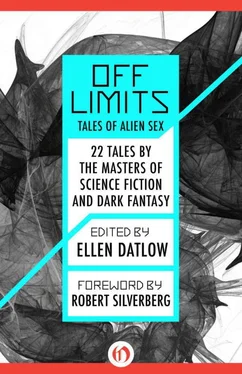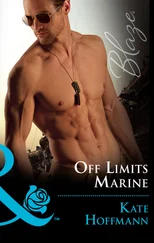She heard him, downstairs: an intermittent whining, murmurous singsong. He was in the rear porch, or possibly in the kitchen.
Quietly, slipping on her robe, Eunice made her way downstairs. Her hair was sticky against her forehead and the nape of her neck; her body was covered in an acrid film of perspiration; the tender skin of the insides of her thighs chafed. Yes, he was in the kitchen: the strange sound was coming from there. Eunice hesitated a moment before pushing open the door, boldly entering. This is my house, my life. He’s come to me. Why should I be fearful!
This time, Eunice saw clearly that the creature was human: batlike about the head, with a monkey’s long spindly arms, but obviously human. And male.
Obviously, male.
Eunice had surprised him in the act of pawing open a box of uncooked macaroni. He’d climbed up onto the kitchen counter and had managed to open one of the cupboard doors.
They stared at each other. The creature was crouched, but Eunice could see he had grown to about the size of a ten or eleven-year-old boy. He was starkly naked, his ribs showed, his chest rapidly rising and falling as he panted. His head was disproportionately large for his shoulders; his legs were stunted, bowed as if from malnutrition; his skin was olive-dark, with that pallor beneath, and covered in fine, near-invisible black hairs like iron filings. His shrunken genitalia hung shyly between his thighs like skinned fruit. His eyes were fierce, shining, frightened, defiant.
Eunice said, in a voice of surprising calm, “Poor thing!—you’re starving.”
Never in her life had Eunice felt such a sensation of pity, compassion, urgency. As the naked creature, crouched on her counter, made a bleating, pleading sound, she felt her breasts ache, throbbing with the need to nurse.
But it was solids Eunice fed the creature, for he had teeth now, however rudimentary, set sparely and unevenly in his tender gums. Eunice wrapped him in a quilt, found an old pair of furry slippers for his knobby-toed feet, sat him in the breakfast nook (which alarmed him initially—his instinct was to resist being cornered, trapped) and spoon-fed him three soft-boiled eggs, most of a pint container of cottage cheese, a tangerine. How hungry he was!—and what pleasure in sating that hunger! His eyes brimmed with tears, like Eunice’s own, as rapidly he chewed and swallowed, chewed and swallowed. Eunice said, “Don’t ever be frightened again! Nothing bad will happen to you. I promise. I promise with my life.”
Eunice’s voice fairly vibrated with excitement yet she spoke practicably, calmly. Her years of authority as professor and administrator stood her well in such an emergency.
As before, Eunice left the creature sleeping on the old sofa-swing in the porch, for he was resistant to coming farther into the house, even into the living room where it was warm. Groggy after his feeding, he seemed virtually to collapse, to become boneless, very like a human infant as Eunice half carried him out onto the porch and laid him gently on the sofa-swing. How astonished she would have been, as a girl growing up in this house, sitting on this swing years ago and reading one of her innumerable books, to imagine what the future held: what fellow creature would one day lie on this very piece of furniture! Beneath the quilt the creature curled up at once, knees to chest, face pushed against knees, sinking into the deep, pulsating sleep of an infant. For many minutes Eunice crouched beside him, her hand against his bony forehead, which seemed to her overwarm, feverish. Unless it was she who was feverish. I promise. With my life.
Frequently he was gone when Eunice returned from the Academy and forlornly she walked through the empty house calling, “Where are you? Are you hiding?”—her manner stern, to disguise the abject sound of worry. To disguise her helplessness—so female. There was no name for the creature she could utter save you; to herself, she thought of him as he, him.
In the kitchen, she might find the remains of his feeding, for by degrees he’d become capable of feeding himself, though messily: a gnawed rind of cheddar cheese might be lying on the floor, part of a banana (he had not yet learned to peel bananas, though Eunice had tried to instruct him—he bit into both fruit and peel, and chewed as best he could), an emptied container of raw hamburger. Though Eunice had not yet succeeded in coaxing him into a bathtub, for the sound of running water, perhaps the very smell of water, as well as the confinement of a bathroom, threw him into a panic, it seemed to her that his odor was less defined now. At any rate, she had ceased to notice it.
(Though one day, at the Academy, a colleague who had entered Eunice’s office quite visibly glanced around, sniffing, puzzled—did she notice the elusive scent? Without breaking their train of conversation, Eunice unobtrusively rose from her desk and opened a window and the offensive odor vanished. Or so Eunice thought.)
By night he might suddenly reappear. One moment the brown-stone was empty of all inhabitants save Eunice, the next—the creature was waiting in the shadows on the stairway landing, his eyes gleaming agate-bright and sly as she ascended into their beam; or he was gliding noiselessly, barefoot along the carpeted hall outside her bedroom. He’d learned to laugh, somehow—a low, guttural, thrilling chuckle. Thick black hairs now sprouted on his head, on his chest and beneath his arms; Eunice would never have looked, but knew that his pubic region bristled with such hairs. He was growing, maturing rapidly, nourished by her care. His shining eyes glanced level with hers. He could speak, not words exactly but sounds—“Eeee?—eeee? Eeeeeyah?” which Eunice believed she could interpret.
“Downstairs,” Eunice would say. Pointing with her forefinger, so there could be no misunderstanding. “You’re not to be up here. But down there .”
Always at such times Eunice spoke sternly to the creature. He might choose to disobey her but he could not choose to misunderstand her, and Eunice knew that that was crucial.
Sometimes, ducking his head, he murmured, “Eeeee?—eeee—” and turned to rapidly descend the stairs, like a scolded dog. At other times, a rebellious dog, he threw back his head defiantly, stared at Eunice from beneath his bristling eyebrows, and drew his lips taut across his uneven teeth. Maintaining her poise Eunice said, “You hear me! You know perfectly well what I’m saying— you! ”
With dignity then Eunice would brush past the creature, who stood long-armed and resistant, in shirt, slacks, sneakers Eunice had bought for him which he’d already outgrown: brushed past him coolly, and entered her bedroom, and shut the door firmly against him. It was a door with an old-fashioned bolt lock.
So long as Eunice was awake, there was no danger.
Often, she sat up in bed, reading, or working on reports and memos in longhand for her secretary at the Academy to type out on a word processor the next morning. She did not think of herself as an obsessive person, one driven by her work. There was a true pleasure in such nighttime concentration; the sense, at such times, of the world radically narrowed, shrunken to the size of the light that illuminated her bed. I love and respect my work and that’s why I’m good at it —Eunice’s father once surprised her with these words, and so it seemed to Eunice the same might be said of her as well, though she was not one for such pronouncements. I love and respect my work and that’s why I’m good at it. Yet how ironic—a thorn in her heart—that the creature who shared her home with her, whose life she had saved, and continued to save, knew nothing of her outer, public, professional self. And cares nothing. For why should he?
Читать дальше












